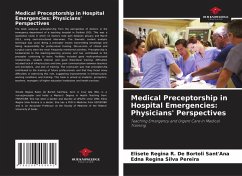
Optimizing Doctors Availability and Appointment Allocation in Hospital
Enhancing Healthcare Efficiency Through Smart Scheduling
Versandkostenfrei!
Versandfertig in 6-10 Tagen
29,99 €
inkl. MwSt.

PAYBACK Punkte
15 °P sammeln!
The modern world is witnessing remarkable progress in digital technologies and artificial intelligence (AI), transforming various sectors, including education, transport, finance, and most importantly, healthcare. As the population grows and urban areas become more congested, traditional healthcare systems are struggling to meet increasing demands. One of the significant challenges faced by the healthcare sector is the inefficient allocation of patients to doctors. This inefficiency leads to multiple issues: prolonged waiting times for patients, overworked healthcare professionals, and the und...
The modern world is witnessing remarkable progress in digital technologies and artificial intelligence (AI), transforming various sectors, including education, transport, finance, and most importantly, healthcare. As the population grows and urban areas become more congested, traditional healthcare systems are struggling to meet increasing demands. One of the significant challenges faced by the healthcare sector is the inefficient allocation of patients to doctors. This inefficiency leads to multiple issues: prolonged waiting times for patients, overworked healthcare professionals, and the underutilization of available medical resources. These problems reduce the overall quality of care and patient satisfaction, and they delay the timely delivery of medical assistance, which can be critical in emergencies.Today, many patients have to manually search for doctors, check their availability, and travel considerable distances to seek consultation, even when a suitable and available doctor might be nearby. In hospitals, especially in emergency units, the allocation of incoming patients is often done manually, without a systematic or optimized method.












